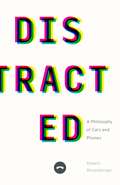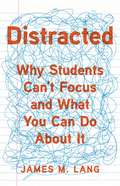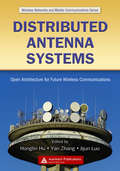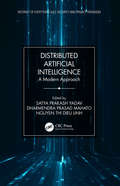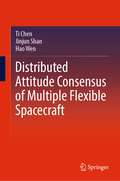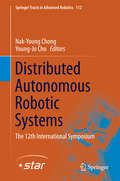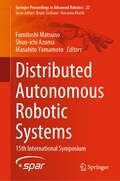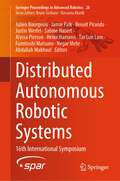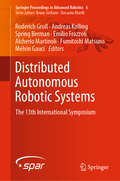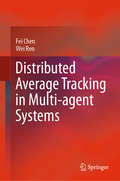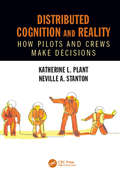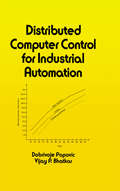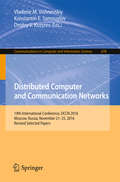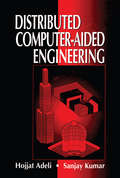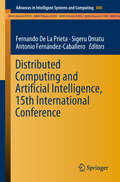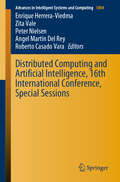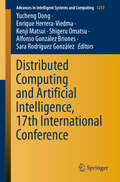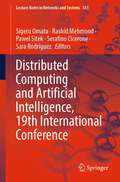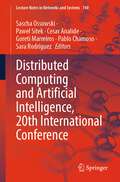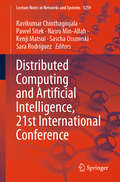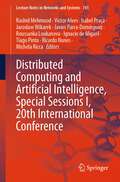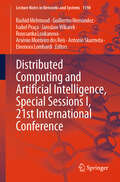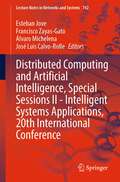- Table View
- List View
Distracted: A Philosophy of Cars and Phones
by Robert RosenbergerApplying insights from philosophy and cognitive science to address the urgent issue of smartphone-induced distracted driving Although the dangers of texting while driving are widely known, many people resist the idea that phone usage will impair their driving. And connectivity features in new cars have only made using technology behind the wheel more tempting. What will it take to change people&’s minds and behavior? Robert Rosenberger contends that a better understanding of why this combination of technologies is so dangerous could effectively adjust both habits and laws. Rosenberger brings together ideas from philosophy and cognitive science to leverage a postphenomenological perspective that reveals how our smartphones make us such bad drivers. Reviewing decades of empirical studies in cognitive science, he shows that we have developed habits of perception regarding our compulsive technology use—habits that may wrest our attention away from the road. Distracted develops innovative concepts for understanding technology-related habits and the ways that our relationships to our devices influence how we perceive the world. In turn, these ideas can help drivers be more cognizant of the effect that smartphone usage has on their perceptions, better inform efforts to enact stricter regulations, and help us all to be more reflective about the technologies that shape our lives.
Distracted: Why Students Can't Focus and What You Can Do About It
by James M. LangKeeping students focused can be difficult in a world filled with distractions -- which is why a renowned educator created a scientific solution to one of every teacher's biggest problems.Why is it so hard to get students to pay attention? Conventional wisdom blames iPhones, insisting that access to technology has ruined students' ability to focus. The logical response is to ban electronics in class. But acclaimed educator James M. Lang argues that this solution obscures a deeper problem: how we teach is often at odds with how students learn. Classrooms are designed to force students into long periods of intense focus, but emerging science reveals that the brain is wired for distraction. We learn best when able to actively seek and synthesize new information. In Distracted, Lang rethinks the practice of teaching, revealing how educators can structure their classrooms less as distraction-free zones and more as environments where they can actively cultivate their students' attention. Brimming with ideas and grounded in new research, Distracted offers an innovative plan for the most important lesson of all: how to learn.
Distress
by Greg EganOn the utopian, man-made island, Stateless, Nobel Prize winner Violet Mosala is close to solving the greatest problem of her career - the quest for the ultimate Theory of Everything (TOE) is almost over.Burned out by recording the abuses of biotech for his TV news syndicate, Andrew Worth grabs the chance to follow Violet's story. In contrast the world of theoretical physics seems like an anaesthetised mathematical heaven, where everything is cool and abstract. He could not have been more wrong. One by one Mosala's rival quantum physicists are disappearing from the scientific summit at Stateless. But why? Is it something to do with Violet herself, or is there some other, more esoteric, force at work undermining the Theory of Everything Conference?
Distress
by Greg EganOn the utopian, man-made island, Stateless, Nobel Prize winner Violet Mosala is close to solving the greatest problem of her career - the quest for the ultimate Theory of Everything (TOE) is almost over.Burned out by recording the abuses of biotech for his TV news syndicate, Andrew Worth grabs the chance to follow Violet's story. In contrast the world of theoretical physics seems like an anaesthetised mathematical heaven, where everything is cool and abstract. He could not have been more wrong. One by one Mosala's rival quantum physicists are disappearing from the scientific summit at Stateless. But why? Is it something to do with Violet herself, or is there some other, more esoteric, force at work undermining the Theory of Everything Conference?
Distributed Antenna Systems: Open Architecture for Future Wireless Communications
by Yan Zhang Honglin Hu Jijun LuoThe rapid growth in mobile communications has led to an increasing demand for wideband high data rate communications services. In recent years, the Distributed Antenna System (DAS) has emerged as a promising candidate beyond 3G and 4G mobile communications. Distributed Antenna Systems: Open Architecture for Future Wireless Communications is
Distributed Artificial Intelligence: A Modern Approach (Internet of Everything (IoE))
by Satya Prakash Yadav, Dharmendra Prasad Mahato, and Nguyen Thi Dieu LinhDistributed Artificial Intelligence (DAI) came to existence as an approach for solving complex learning, planning, and decision-making problems. When we talk about decision making, there may be some meta-heuristic methods where the problem solving may resemble like operation research. But exactly, it is not related completely to management research. The text examines representing and using organizational knowledge in DAI systems, dynamics of computational ecosystems, and communication-free interactions among rational agents. This publication takes a look at conflict-resolution strategies for nonhierarchical distributed agents, constraint-directed negotiation of resource allocations, and plans for multiple agents. Topics included plan verification, generation, and execution, negotiation operators, representation, network management problem, and conflict-resolution paradigms. The manuscript elaborates on negotiating task decomposition and allocation using partial global planning and mechanisms for assessing nonlocal impact of local decisions in distributed planning. The book will attract researchers and practitioners who are working in management and computer science, and industry persons in need of a beginner to advanced understanding of the basic and advanced concepts.
Distributed Attitude Consensus of Multiple Flexible Spacecraft
by Ti Chen Jinjun Shan Hao WenThis book mainly presents the authors' recent studies on the distributed attitude consensus of multiple flexible spacecraft. Modified Rodrigues parameters and rotation matrix are used to represent spacecraft attitude. Several distributed adaptive controllers are presented with theoretical analyses, numerical simulations and experimental verifications. The authors intend to provide a manual that allows researchers, engineers and students in the field of aerospace engineering and mechanics to learn a theoretical and practical approach to the design of attitude consensus algorithms.
Distributed Autonomous Robotic Systems
by Nak-Young Chong Young-Jo ChoThis volume of proceedings includes 32 original contributions presented at the 12th International Symposium on Distributed Autonomous Robotic Systems (DARS 2014), held in November 2014. The selected papers in this volume are authored by leading researchers from Asia, Australia, Europe, and the Americas, thereby providing a broad coverage and perspective of the state-of-the-art technologies, algorithms, system architectures, and applications in distributed robotic systems.
Distributed Autonomous Robotic Systems: 15th International Symposium (Springer Proceedings in Advanced Robotics #22)
by Fumitoshi Matsuno Shun-Ichi Azuma Masahito YamamotoThis book presents the state of the art in distributed autonomous systems composed of multiple robots, robotic modules, or robotic agents. Swarms in nature can not only adapt to their environments, but can also construct suitable habitats to their own advantage. Distributed autonomous robotic systems can do many things that its individuals cannot do alone. As the global pandemic was still ongoing, the 15th International Symposium on Distributed Autonomous Robotic Systems (DARS2021) was held on June 1–4, 2021, as an online meeting. The scope of DARS201 was to create a bridge between biologists and engineers interested in the distributed intelligence of living things and to establish a new academic field by integrating knowledge from both disciplines. Topics of DARS2021 were swarm intelligence, swarm robotics, multi-agent system, modular robotics, decentralized control, distributed system, etc. The papers in this book provide a very good overview of the state of the art in distributed autonomous robotic systems (DARS). They reflect current research themes in DARS with important contributions. We hope that this book helps to sustain the interest in DARS and triggers new research.
Distributed Autonomous Robotic Systems: 16th International Symposium (Springer Proceedings in Advanced Robotics #28)
by Heiko Hamann Fumitoshi Matsuno Justin Werfel Julien Bourgeois Abdallah Makhoul Tin Lun Lam Jamie Paik Benoît Piranda Sabine Hauert Alyssa Pierson Negar MehrThis book of the SPAR series contains 39 scientific articles presented in the Distributed Autonomous Robotic Systems conference organized in November 28–30, 2022, in Montbéliard, France. The contributions are covering a broad scope of topics within distributed robotics including mobile sensor networks, unmanned aerial vehicles, multi-agent systems, algorithms for multi-robot systems, modular robots, swarm robotics, and reinforcement learning or deep learning applied to multi-robot systems.
Distributed Autonomous Robotic Systems: The 13th International Symposium (Springer Proceedings In Advanced Robotics Ser. #6)
by Roderich Groß Andreas Kolling Spring Berman Emilio Frazzoli Alcherio Martinoli Fumitoshi Matsuno Melvin GauciDistributed robotics is an interdisciplinary and rapidly growing area, combining research in computer science, communication and control systems, and electrical and mechanical engineering. Distributed robotic systems can autonomously solve complex problems while operating in highly unstructured real-world environments. They are expected to play a major role in addressing future societal needs, for example, by improving environmental impact assessment, food supply, transportation, manufacturing, security, and emergency and rescue services. The goal of the International Symposium on Distributed Autonomous Robotic Systems (DARS) is to provide a forum for scientific advances in the theory and practice of distributed autonomous robotic systems. This volume of proceedings include 47 original contributions presented at the 13th International Symposium on Distributed Autonomous Robotic Systems (DARS 2016), which was held at the Natural History Museum in London, UK, from November 7th to 9th, 2016. The selected papers in this volume are authored by leading researchers from around the world, thereby providing a broad coverage and perspective of the state-of-the-art technologies, algorithms, system architectures, and applications in distributed robotic systems. The book is organized into seven parts, representative of critical long-term and emerging research thrusts in the multi-robot community: Distributed Coverage and Exploration; Multi-Robot Control; Multi-Robot Estimation; Multi-Robot Planning; Modular Robots and Smart Materials; Swarm Robotics; and Multi-Robot Systems in Applications.
Distributed Average Tracking in Multi-agent Systems
by Fei Chen Wei RenThis book presents a systematic study of an emerging field in the development of multi-agent systems. In a wide spectrum of applications, it is now common to see that multiple agents work cooperatively to accomplish a complex task. The book assists the implementation of such applications by promoting the ability of multi-agent systems to track — using local communication only — the mean value of signals of interest, even when these change rapidly with time and when no individual agent has direct access to the average signal across the whole team; for example, when a better estimation/control performance of multi-robot systems has to be guaranteed, it is desirable for each robot to compute or track the averaged changing measurements of all the robots at any time by communicating with only local neighboring robots. The book covers three factors in successful distributed average tracking: algorithm design via nonsmooth and extended PI control;distributed average tracking for double-integrator, general-linear, Euler–Lagrange, and input-saturated dynamics; andapplications in dynamic region-following formation control and distributed convex optimization. The book presents both the theory and applications in a general but self-contained manner, making it easy to follow for newcomers to the topic. The content presented fosters research advances in distributed average tracking and inspires future research directions in the field in academia and industry.
Distributed Cognition and Reality: How Pilots and Crews Make Decisions (100 Cases)
by Neville A. Stanton Katherine L. PlantDistributed Cognition and Reality puts theory into practice, as the first book to show how to apply the Perceptual Cycle Model in aviation decision making. Based on case studies, critical incident interviews and live observations in cockpits, the authors develop a new way to understand how pilots and crews make decisions. This book will be useful for practitioners involved in accident and incident investigations and decision-making training, researchers and students within the disciplines of Aviation, Human Factors, Ergonomics, Engineering, Computer Science, and Psychology. Dr Katherine L Plant is a New Frontiers Fellow in Human Factors Engineering at the University of Southampton in the UK. In 2014 she was awarded the Honourable Company of Air Pilots Prize for Aviation Safety Research. Professor Neville A Stanton holds the Chair in Human Factors Engineering at the University of Southampton in the UK. In 2007 The Royal Aeronautical Society awarded him the Hodgson Medal for his work on flight-deck safety.
Distributed Computer Control Systems in Industrial Automation
by VijayP. BhatkarA reference guide for professionals or text for graduate and postgraduate students, this volume emphasizes practical designs and applications of distributed computer control systems. It demonstrates how to improve plant productivity, enhance product quality, and increase the safety, reliability, and
Distributed Computer and Communication Networks
by Vladimir M. Vishnevskiy Konstantin E. Samouylov Dmitry V. KozyrevThisbook constitutes the refereed proceedings of the 18th International Conferenceon Distributed and Computer and Communication Networks, DCCN 2015, held inMoscow, Russia, in October 2015. The 38 revised full papers presented were carefully reviewed andselected from 94 submissions. The papers cover the following topics: computerand communication networks architecture optimization; control in computer andcommunication networks; performance and QoS evaluation in wireless networks;modeling and simulation of network protocols; queuing and reliability theory;wireless IEEE 802. 11, IEEE 802. 15, IEEE 802. 16, and UMTS (LTE) networks; FRIDtechnology and its application in intellectual transportation networks;protocols design (MAC, Routing) for centimeter and millimeter wave meshnetworks; internet and web applications and services; application integrationin distributed information systems; big data in communication networks.
Distributed Computer-Aided Engineering
by Sanjay Kumar Hojjat AdeliNetworking of personal computers and workstations is becoming commonplace in academic and industrial environments. A cluster of workstations provides engineers with a familiar, cost-effective environment for high performance computing. However, workstations often have no dedicated link and communicate slowly on a local area network (LAN), such as the Ethernet. Thus, to effectively harness the parallel processing or distributed computing capabilities of workstations, new algorithms need to be developed with a higher computation-to-communication ratio.Distributed Computer-Aided Engineering presents distributed algorithms for three fundamental areas: finite element analysis, design optimization, and visualization - providing a new direction in high performance structural engineering computing.
Distributed Computing and Artificial Intelligence, 15th International Conference (Advances in Intelligent Systems and Computing #800)
by Antonio Fernández-Caballero Fernando De La Prieta Sigeru OmatuThe 15th International Symposium on Distributed Computing and Artificial Intelligence 2018 (DCAI 2018) is a forum to present applications of innovative techniques for studying and solving complex problems. The exchange of ideas between scientists and technicians from both the academic and industrial sector is essential to facilitate the development of systems that can meet the ever-increasing demands of today’s society. The present edition brings together past experience, current work and promising future trends associated with distributed computing, artificial intelligence and their application in order to provide efficient solutions to real problems.This symposium is organized by the University of Castilla-La Mancha, the Osaka Institute of Technology and the University of Salamanca. The present edition was held in Toledo, Spain, from 20th – 22nd June, 2018.
Distributed Computing and Artificial Intelligence, 16th International Conference, Special Sessions (Advances in Intelligent Systems and Computing #1004)
by Zita Vale Enrique Herrera-Viedma Peter Nielsen Angel Martin Del Rey Roberto Casado VaraThis book presents the outcomes of the special sessions of the 16th International Conference on Distributed Computing and Artificial Intelligence 2019, a forum that brought together ideas, projects and lessons associated with distributed computing and artificial intelligence, and their applications in various areas. Artificial intelligence is currently transforming our society. Its application in distributed environments, such as the internet, electronic commerce, environmental monitoring, mobile communications, wireless devices, and distributed computing, to name but a few, is continuously increasing, making it an element of high added value and tremendous potential. These technologies are changing constantly as a result of the extensive research and technical efforts being pursued at universities and businesses alike. The exchange of ideas between scientists and technicians from both the academic and industrial sectors is essential to facilitating the development of systems that can meet the ever-growing demands of today’s society. This year’s technical program was characterized by high quality and diversity, with contributions in both well-established and evolving areas of research. More than 120 papers were submitted to the main and special sessions tracks from over 20 different countries (Algeria, Angola, Austria, Brazil, Colombia, France, Germany, India, Italy, Japan, the Netherlands, Oman, Poland, Portugal, South Korea, Spain, Thailand, Tunisia, the United Kingdom and United States), representing a truly “wide area network” of research activity. The symposium was jointly organized by the Osaka Institute of Technology and the University of Salamanca. This year’s event was held in Avila, Spain, from 26th to 28th June, 2019. The authors wish to thank the sponsors: the IEEE Systems Man and Cybernetics Society, Spain Section Chapter and the IEEE Spain Section (Technical Co-Sponsor), IBM, Indra, Viewnext, Global Exchange, AEPIA, APPIA and AIR institute.
Distributed Computing and Artificial Intelligence, 17th International Conference (Advances in Intelligent Systems and Computing #1237)
by Yucheng Dong Kenji Matsui Enrique Herrera-Viedma Sara Rodríguez González Shigeru Omatsu Alfonso González BrionesThis book brings together past experience, current work and promising future trends associated with distributed computing, artificial intelligence and their application in order to provide efficient solutions to real problems. DCAI 2020 is a forum to present applications of innovative techniques for studying and solving complex problems in artificial intelligence and computing areas. This year’s technical program will present both high quality and diversity, with contributions in well-established and evolving areas of research. Specifically, 83 papers were submitted to main track and special sessions, by authors from 26 different countries representing a truly “wide area network” of research activity. The DCAI’20 technical program has selected 35 papers and, as in past editions, it will be special issues in ranked journals. This symposium is organized by the University of L'Aquila (Italy). We would like to thank all the contributing authors, the members of the Program Committee and the sponsors (IBM, Armundia Group, EurAI, AEPIA, APPIA, CINI, OIT, UGR, HU, SCU, USAL, AIR Institute and UNIVAQ).
Distributed Computing and Artificial Intelligence, 19th International Conference (Lecture Notes in Networks and Systems #583)
by Sara Rodríguez Rashid Mehmood Sigeru Omatu Pawel Sitek Serafino CiceroneDCAI 2022 is a forum to present applications of innovative techniques for studying and solving complex problems in artificial intelligence and computing areas. The present edition brings together past experience, current work and promising future trends associated with distributed computing, artificial intelligence and their application in order to provide efficient solutions to real problems. This year’s technical program will present both high quality and diversity, with contributions in well-established and evolving areas of research. Specifically, 61 papers were submitted, by authors from 28 different countries representing a truly “wide area network” of research activity. The DCAI’22 technical program has selected 32 full papers and, as in past editions, it will be special issues in ranked journals. This symposium is organized by the University of L'Aquila (Italy). We would like to thank all the contributing authors, the members of the Program Committee and the sponsors (IBM, Indra, Dipartimento di Ingegneria e Scienze dell'Informazione e Matematica dell'Università degli Studi dell'Aquila, Armundia Group, Whitehall Reply, T.C. Technologies And Comunication S.R.L., LCL Industria Grafica, AIR Institute, AEPIA, APPIA).
Distributed Computing and Artificial Intelligence, 20th International Conference (Lecture Notes in Networks and Systems #740)
by Sascha Ossowski Cesar Analide Sara Rodríguez Goreti Marreiros Pablo Chamoso Pawel SitekThe present book brings together experience, current work, and promising future trends associated with distributed computing, artificial intelligence, and their application in order to provide efficient solutions to real problems. DCAI 2023 is a forum to present applications of innovative techniques for studying and solving complex problems in artificial intelligence and computing areas. This year’s technical program presents both high quality and diversity, with contributions in well-established and evolving areas of research. Specifically, 108 papers were submitted, by authors from 31 different countries representing a truly “wide area network” of research activity. The DCAI 23 technical program has selected 36 full papers in the main track and, as in past editions, there will be special issues in ranked journals. This symposium is organized by the LASI and Centro Algoritmi of the University of Minho (Portugal). The authors like to thank all the contributing authors, the members of the Program Committee, National Associations (AEPIA, APPIA), and the sponsors (AIR Institute).
Distributed Computing and Artificial Intelligence, 21st International Conference (Lecture Notes in Networks and Systems #1259)
by Sascha Ossowski Sara Rodríguez Kenji Matsui Pawel Sitek Ravikumar Chinthaginjala Nasro Min-AllahThis book serves as a forum to present applications of innovative techniques for studying and solving complex problems in artificial intelligence and computing. This edition brings together experience, current work, and promising future trends related to distributed computing, artificial intelligence, and their applications to provide efficient solutions to real-world problems. The technical program this year is both high in quality and diverse, featuring contributions from well-established and evolving research areas. Specifically, 138 papers were submitted by authors from 43 different countries, representing a truly global network of research activity. The DCAI’24 technical program has selected 36 full papers for the main track, and as in previous editions, there will be special issues in ranked journals. This symposium is organized by the University of Salamanca (Spain). The authors would like to thank all the contributing authors, the program committee members, National Associations (AEPIA, APPIA, LASI), and the sponsors (AIR Institute).
Distributed Computing and Artificial Intelligence, Special Sessions I, 20th International Conference (Lecture Notes in Networks and Systems #741)
by Ricardo Nunes Tiago Pinto Rashid Mehmood Roussanka Loukanova Michela Ricca Isabel Praça Victor Alves Jarosław Wikarek Javier Parra-Domínguez Ignacio De MiguelThe present book brings together experience, current work, and promising future trends associated with distributed computing, artificial intelligence, and their application in order to provide efficient solutions to real problems. DCAI 2023 is a forum to present applications of innovative techniques for studying and solving complex problems in artificial intelligence and computing areas. This year’s technical program presents both high quality and diversity, with contributions in well-established and evolving areas of research. Specifically, 108 papers were submitted, by authors from 31 different countries representing a truly “wide area network” of research activity. The DCAI’23 technical program has selected 50 full papers in the Special Sessions (ASET, AIMPM, AI4CS, CLIRAI, TECTONIC, PSO-ML, SmartFoF, IoTalentum) and, as in past editions, it will be special issues in ranked journals. This symposium is organized by the LASI and Centro Algoritmi of the University of Minho (Portugal). The authors like to thank all the contributing authors, the members of the Program Committee, National Associations (AEPIA, APPIA), and the sponsors (AIR Institute).
Distributed Computing and Artificial Intelligence, Special Sessions I, 21st International Conference (Lecture Notes in Networks and Systems #1198)
by Antonio Skarmeta Rashid Mehmood Roussanka Loukanova Isabel Praça Jaroslaw Wikarek Guillermo Hernández Arsénio Monteiro dos Reis Eleonora LombardiThis book presents applications of innovative techniques for studying and solving complex problems in artificial intelligence and computing. This edition brings together experience, current work, and promising future trends related to distributed computing, artificial intelligence, and their applications to provide efficient solutions to real-world problems. Given the conference's success, this edition features twelve special sessions covering a wide range of topics related to AI and other areas of interest. These sessions were carefully curated to address the latest advancements and challenges in fields such as machine learning, neural networks, IoT, big data, and blockchain, among others. The accepted papers from these sessions are presented in two volumes, showcasing the diverse and innovative research being conducted in these domains. This is the first volume, which includes the sessions: Artificial intelligence for enhanced cyber security (AI4CS), AI-driven methods for multimodal networks and processes modeling (AIMPM), computational linguistics, information, reasoning, and AI (CLIRAI), novel technologies for smart industry and mobility (SmartMob), intelligent Internet of things security and privacy (WISP) and revolutionizing carbon farming by nature-based business models and emerging innovations in the field of artificial intelligence, satellite and green technologies (INNO4CFIS), each focusing on specific themes within the broader scope of AI and its applications. The DCAI’24 technical program has selected 74 papers in special sessions and, as in past editions, it will be special issues in ranked journals. This symposium is organized by the University of Salamanca (Spain). The authors would like to thank all the contributing authors, the program committee members, national associations (AEPIA, APPIA, LASI), and the sponsors (AIR Institute).
Distributed Computing and Artificial Intelligence, Special Sessions II - Intelligent Systems Applications, 20th International Conference (Lecture Notes in Networks and Systems #742)
by Esteban Jove Francisco Zayas-Gato Álvaro Michelena José Luis Calvo-RolleThis book of LNNS contains accepted papers presented at DCAI conference in the Special Session on Intelligent Systems Applications (ISA), Guimarães (Portugal), July 2023. ISA is a major forum for presentation of development and applications of innovative techniques in the fields of building management, assistive technologies, the applied engineering, and industry. The scientific committee of the ISA has selected 8 full papers for its publication. This year ISA Special Session has teamed up with “Logic Journal of the IGPL” (Oxford University Press) for one special issue including selected papers from ISA Special Session 2023. We would like to thank all the contributing authors, the members of the Program Committee, the Organizing Committee of the Universities of Minho, and Salamanca for their hard and highly valuable work, which has been essential for the success of ISA 2023.
